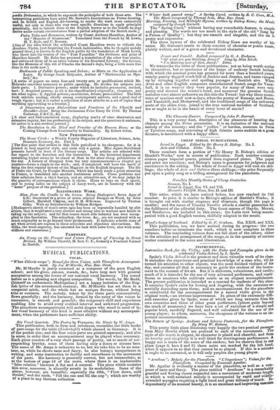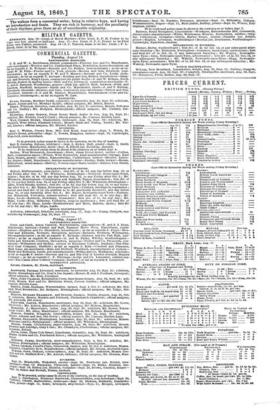MUSICAL PUBLICATIONS.
VOCAL.
"When Chloris weeps"; Round for three Voices, with Pianoforte Accompani- ment. By Jos. APMurdie, Miss. Bac. Oxon. Mr. M`Munlie is justly esteemed as a composer of the pure English school; and his glees, canons, rounds, &c., have long met with general acceptation among the lovers of our national vocal harmony. The round before us is a pleasing and elegant composition. The words, by Mr. Budd, (himself an enthusiastic Madrigalian,) are a happy imitation of the Eng- lish lyrics of the seventeenth century; Mr. M‘Murdie has set them in a congenial spirit; and the whole has an antique flavour, without being trite or common. The melody, taken by the three parts consecutively, flows gracefully; and the harmony, formed by the entry of the voices in succession, is smooth and grateful; the composer's skill and experience enabling him to avoid every crabbed interval and awkward progression. The pianoforte accompaniment will assist singers who stand in need of it; but vocal harmony of this kind is most effective without any accompani- ment, when the performers have sufficient ability.
Six Vocal Quartets. The Poetry by Tennyson; the Music by W. Amps.
This publication, both in form and substance, resembles the little books Of part-songs for the table (Liedertafel) which abound in Germany. It is Of the pocket size; and the four voice-parts are printed separately, and also in score, in order that an accompaniment may be played when necessary. Each piece consists of a very short passage of poetry, set to music of cor- responding brevity, some of them having only a dozen or sixteen bars. The name of Mr. Amps is unknown to us, but we take him to be an ama- teur, as, while he shows taste and fancy, he also betrays inexperience in writing, and some inattention to facility and smoothness in the movement of the parts. His harmony is generally correct, but not immaculate; as at the bottom of page 18 of the score, where there is an inadmissible "false relation" between A flat and A natural. The piece which contains this error, moreover, is absurdly erratic in its modulation. Some of the pieces, however, are beautiful; especially the fifth, "Flow down, cold rivulet," and the sixth, "Fill the can and fill the cup "; which are worthy Of a place in any German collection.
"Winter hath passed away." A Spring Carol, written by R. C. Core, M.A. The Music composed by Thomas Ions, Miss. Bee. Oxon. Morning, Evening, and Midnight Hymns, written by Bishop Kenn; the Music composed by Joseph Garnett.
The Spring Carol," without having any remarkable feature, is simple and pleasing. The words are too much in the style of the old" Song by a Person of Quality "; but they are smooth and singable, and the air is pretty and expressive.
The three hymns of the celebrated Bishop Kenn are worthy of his name. Mr. Garnett's music to them consists of chorales or psalm tunes, plainly written, and of a grave and devotional character.
Jeanie and Donald. Ballad, composed by G. A. Hodgson. "Of what are you thinking, Jenny?" Sung by Milts Birch. "Ins thinking now of thee, Jamie." Ditto.
We transcribe the titles of these publications, not as being worth notice in themselves, but as specimens of the heaps of cockney Scotch ballads with which the musical press has groaned for more than a hundred years; namby-pamby doggrel stuck full of Jockies and Jennies and tunes vamped up by stringing together and spoiling passages of Scottish airs. When Arne and other English composers manufactured Scotch songs for Vaux- hall, it is no wonder they were popular, for many of them were very pretty and showed the master's band, and moreover the genuine Scotch melodies were almost unknown on this side the Tweed: but why these moun- tains of spurious stuff now-a-days, when the poetry of Ramsay, and Burns, and Tannehill, and Motherwell, and the traditional songs of the unknown poets of the olden time, joined to the true national melodies of Scotland, are or ought to be in the hands of every lover of music?
The Chamois-Hunter. Composed by John P. Barratt.
This is a very pretty duet, descriptive of the pleasures of hunting the chamois among the Swiss mountains. It is an imitation of the national melody of the country; and the " yodlen " or burden, common in Swiss or Tyrolese songs, and consisting of high falsetto notes audible at a great distanco, is introduced with a happy effect.'
CHEAP SERIAL PUBLICATIONS.
Israel in Egypt. Edited by Sir Henry R. Bishop. No. I.
Ads and Galatea. Ditto. No. L These numbers form a portion- of "Sir Henry R. Bishop's edition of Handel's Works," now in course of publication. Each number contains sixteen pages imperial quarto, printed from engraved plates. The paper and print are excellent; and Bishop's name is guarantee for judgment and correctness in the editing. The whole of Israel in Egypt will cost six shil- lings; the whole of Acts and Galatea three shillings,—the price frequently put upon a paltry song or a trilling arrangement for the pianoforte.
Novella's Monthly Series of Cheap Oratorios.
Samson, No. I.
Israel in Egypt, Nos. VI. and VII.
Mozart's Twelfth Mass, Nos. II. and HL
This series, which we have noticed before, has now reached its 73/1 number. In price it is similar to Bishop's edition of Handers-Works; it is brought out with similar elegance and ifearness, though the page is smaller; and the name of Vincent Novell° affords a similar guarantee for the fulfilment of the editorial duty. The finest masses of Haydn, Mozart, and Beethoven, are included in this series; the Latin text being accom- panied with a good English version, skilfully adapted to the music.
Wood's Songs of Scotland. Edited by G. F. Graham. Nos. XXLIC. and XXX.
This publication, too, we have noticed during its progress: the two numbers before us terminate the work, which is now complete in three volumes. The concluding volume does not fall short of the others, either in the selection and arrangement of the songs, or in the quantity of curious matter contained in the notes and illustrations.
INSTRUMENTAL.
Instruction-Book for the Violin; with the Rules and Examples given its his celebrated Violin-School, by L. Spohr. Spohr's Violin School is the greatest and most valuable work of its class. It embodies the experience and practical knowledge of a man who, till he turned his attention to other objects, was the most finished violinist of his day, and contains all that is necessary to guide the student of the instru- ment to the summit of his art. But it is elaborate, voluminous, and costly; much of it is intended for the use of very advanced performers, and super- fluous to amateurs who cultivate music as an elegant accomplishment. The present publication is intended as a manual for students of this class. It contains Spohr's rules for bowing and fingering, with the exercises es- sentially depending upon them; and an accompaniment for the pianoforte is substituted for the accompaniment for a second violin given in the original work,—an obvious improvement. In place of the extremely diffi- cult exercises given by Spohr, some of which are long extracts from his own concertos and those of other great performers, (pieces quite beyond the reach of amateurs,) we have here a set of exercises of a simple and popular kind, carefully fingered, and well calculated for the use of the young player; to whom, moreover, the cheapness of the volume is an im- portant recommendation.
The Return of Spring; Andante and Scherzo Pastorale, for the Pianoforte. By Mary W. Holmes.
This pretty little piece illustrates very happily the two poetical passages from Mary Howitt which are prefixed to each of the movements. The style of the music is elegant, its character is placid and cheerful, and from its brevity and simplicity it is well fitted for drawingroom performance. A happy use is made of the notes of the cuckoo; but we observe that in one place (page 3, bars 2 and 3) those notes are marked for the left hand, when it appears to us that they cannot be so played. If this is a mistake it ought to be corrected, as it will only perplex the young player.
" Arethuse"; Melody for the Pianoforte. " L'Impatience"; Valses for the Pianoforte. Composed by Emanuel Aguilar.
Mr. .Aguilar is evidently a master of the pianoforte, as well as a com- poser of taste and fancy. The piece entitled Arethuse " is a remarkably graceful and flowing theme expanded into a movement of moderate length, in which a well-sustained melody is accompanied by rapid and wideliy- extended arpeggios requiring a light hand and great delicacy of touch. dependently of of its musical beauty, ibis an excellent and improving exorcise'
The waltzes form a connected series; being in relative keys, and having an introduction and finale. They are rich in harmony, and the peculiarity of their rhythms gives them an air of considerable originality.



























 Previous page
Previous page